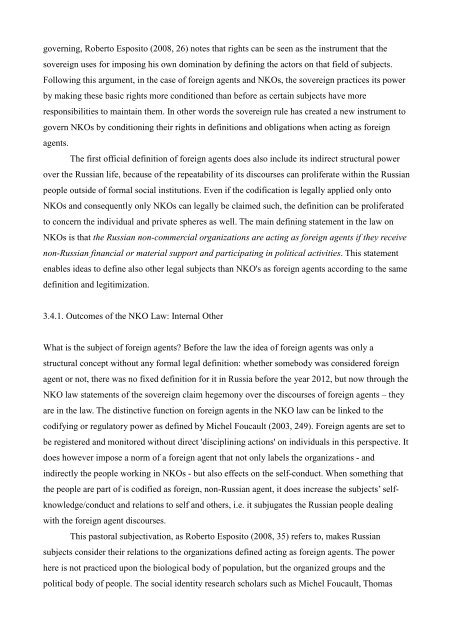Foreign Agents in Russia - Doria
Foreign Agents in Russia - Doria
Foreign Agents in Russia - Doria
You also want an ePaper? Increase the reach of your titles
YUMPU automatically turns print PDFs into web optimized ePapers that Google loves.
45<br />
govern<strong>in</strong>g, Roberto Esposito (2008, 26) notes that rights can be seen as the <strong>in</strong>strument that the<br />
sovereign uses for impos<strong>in</strong>g his own dom<strong>in</strong>ation by def<strong>in</strong><strong>in</strong>g the actors on that field of subjects.<br />
Follow<strong>in</strong>g this argument, <strong>in</strong> the case of foreign agents and NKOs, the sovereign practices its power<br />
by mak<strong>in</strong>g these basic rights more conditioned than before as certa<strong>in</strong> subjects have more<br />
responsibilities to ma<strong>in</strong>ta<strong>in</strong> them. In other words the sovereign rule has created a new <strong>in</strong>strument to<br />
govern NKOs by condition<strong>in</strong>g their rights <strong>in</strong> def<strong>in</strong>itions and obligations when act<strong>in</strong>g as foreign<br />
agents.<br />
The first official def<strong>in</strong>ition of foreign agents does also <strong>in</strong>clude its <strong>in</strong>direct structural power<br />
over the <strong>Russia</strong>n life, because of the repeatability of its discourses can proliferate with<strong>in</strong> the <strong>Russia</strong>n<br />
people outside of formal social <strong>in</strong>stitutions. Even if the codification is legally applied only onto<br />
NKOs and consequently only NKOs can legally be claimed such, the def<strong>in</strong>ition can be proliferated<br />
to concern the <strong>in</strong>dividual and private spheres as well. The ma<strong>in</strong> def<strong>in</strong><strong>in</strong>g statement <strong>in</strong> the law on<br />
NKOs is that the <strong>Russia</strong>n non-commercial organizations are act<strong>in</strong>g as foreign agents if they receive<br />
non-<strong>Russia</strong>n f<strong>in</strong>ancial or material support and participat<strong>in</strong>g <strong>in</strong> political activities. This statement<br />
enables ideas to def<strong>in</strong>e also other legal subjects than NKO's as foreign agents accord<strong>in</strong>g to the same<br />
def<strong>in</strong>ition and legitimization.<br />
3.4.1. Outcomes of the NKO Law: Internal Other<br />
What is the subject of foreign agents? Before the law the idea of foreign agents was only a<br />
structural concept without any formal legal def<strong>in</strong>ition: whether somebody was considered foreign<br />
agent or not, there was no fixed def<strong>in</strong>ition for it <strong>in</strong> <strong>Russia</strong> before the year 2012, but now through the<br />
NKO law statements of the sovereign claim hegemony over the discourses of foreign agents – they<br />
are <strong>in</strong> the law. The dist<strong>in</strong>ctive function on foreign agents <strong>in</strong> the NKO law can be l<strong>in</strong>ked to the<br />
codify<strong>in</strong>g or regulatory power as def<strong>in</strong>ed by Michel Foucault (2003, 249). <strong>Foreign</strong> agents are set to<br />
be registered and monitored without direct 'discipl<strong>in</strong><strong>in</strong>g actions' on <strong>in</strong>dividuals <strong>in</strong> this perspective. It<br />
does however impose a norm of a foreign agent that not only labels the organizations - and<br />
<strong>in</strong>directly the people work<strong>in</strong>g <strong>in</strong> NKOs - but also effects on the self-conduct. When someth<strong>in</strong>g that<br />
the people are part of is codified as foreign, non-<strong>Russia</strong>n agent, it does <strong>in</strong>crease the subjects’ selfknowledge/conduct<br />
and relations to self and others, i.e. it subjugates the <strong>Russia</strong>n people deal<strong>in</strong>g<br />
with the foreign agent discourses.<br />
This pastoral subjectivation, as Roberto Esposito (2008, 35) refers to, makes <strong>Russia</strong>n<br />
subjects consider their relations to the organizations def<strong>in</strong>ed act<strong>in</strong>g as foreign agents. The power<br />
here is not practiced upon the biological body of population, but the organized groups and the<br />
political body of people. The social identity research scholars such as Michel Foucault, Thomas
















